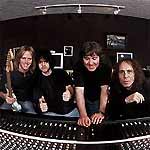| Welcome to the LOUDEST DOT COM ON THE PLANET! | |
 |

|
| Welcome to the LOUDEST DOT COM ON THE PLANET! | |
 |

|
The Quest For Metal Goes On: Jeff Kerbyís Exclusive Interview With Ronnie James Dio, Part I By Jeff Kerby, Contributor Tuesday, December 17, 2002 @ 10:42 AM
 What they may not know is that Dio is they type of thoughtful conversationalist who can bring a wealth of information to the table whenever he engages in communication with someone whether it be a musician heís working with or a random fan that he encounters the day of a show. This, of course, doesnít gibe with the gloom and doom, metal sign throwing harbinger of evil that some would believe him to be. If you think that, then he respects your interpretation, but he still maintains that it isnít what heís about. The message of his music is much broader in scope than one-dimensional tales about the virtues of sacrificing chickens or making assorted gestures with your fingersóitís about people, the world and how the two interface in order to produce the environment that we inhabit. He may use archaic images to express his ideas, but the themes are always deeper and of more relevance than the concrete narrative. While many public figures and musicians seem to view success as a ticket to cease being civil to the regular person, Dio exudes an uncommon sense of humanity and his place in it. Without a doubt, Dioís mind óand more importantly his heartó belie his diminutive physical stature to form components of an individual who truly possesses empathy and is conscious of those around him.
KNAC.COM: Do you create each album with the idea that itís going to enhance your legacy? Do you think Killing The Dragon does that?
What they may not know is that Dio is they type of thoughtful conversationalist who can bring a wealth of information to the table whenever he engages in communication with someone whether it be a musician heís working with or a random fan that he encounters the day of a show. This, of course, doesnít gibe with the gloom and doom, metal sign throwing harbinger of evil that some would believe him to be. If you think that, then he respects your interpretation, but he still maintains that it isnít what heís about. The message of his music is much broader in scope than one-dimensional tales about the virtues of sacrificing chickens or making assorted gestures with your fingersóitís about people, the world and how the two interface in order to produce the environment that we inhabit. He may use archaic images to express his ideas, but the themes are always deeper and of more relevance than the concrete narrative. While many public figures and musicians seem to view success as a ticket to cease being civil to the regular person, Dio exudes an uncommon sense of humanity and his place in it. Without a doubt, Dioís mind óand more importantly his heartó belie his diminutive physical stature to form components of an individual who truly possesses empathy and is conscious of those around him.
KNAC.COM: Do you create each album with the idea that itís going to enhance your legacy? Do you think Killing The Dragon does that? DIO: Actually, I donít ever think of it in those terms. For me, itís a project at a time, and I think that all things you create are a product of how you feel at that moment in time. The things youíve accumulated before that moment and how you feel at that particular time is bound to come out. Iíve planned the last two albums exactly the way they were. The album before this, Magica, was intended to be a complete hearkening back to the fantasy side of what Iíve always done which is kinda one of the things that got me where I am. There for a while I think we were doing some albums that were a little confusing to people as well as ourselves. What I wanted to do here was go back and make the type of music that people expect from me. With Magica, it was totally a fantasy piece because it was conceptual and had a story etc. On Killing The Dragon though, I also wanted to take the part of Dio that was like some of the earlier albums we did like Holy Diver and The Last In Line which were driven by songs that were faster and not so incredibly involved that they were conceptual in nature. This particular album is that next step from Magica to solidify again all the parts that Dio are. KNAC.COM: What is it about the medieval imagery that captivates you, and why have you chosen to stay with it? Havenít you had to make certain decisions in your career regarding what you wanted to write about and how that would impact sales or your visibility?  DIO: Well, for a start, Iíve always felt that if youíre true to something, people will recognize that, and those same people who like what you do will expect that level of comfort from you every time you do it. I think there is certainly the thought of painting yourself into a corner as has happened to me on several occasions because I have been adamant about using this particular style of writing. That being said, this form of expression doesnít allow you to be one of the Spice Girls or ĎNSYNC or be a rapper or whatever, but you just have to stay within the confines. Thatís ok with me, and Iíve found that that has always worked for me. That came from my early life as a kidóIím an only childóIíve read extensively, and most of the things I read were great science fiction or writers like Walter Scott who wrote in terms of medieval imagery. It really made me use my imagination and it became what was important to me. Things I use, like dragons, are things people have never seen and have to be believed within the imagination--they have to be created within the imagination. I always thought this was right for me, so from my reading and my love of being able to write the same things everyone else writes but cloaked in a different way, I have used images of swords and sorcerers and things that exist in the imagination. Itís done ok for JK Rowling so far, so I think Iíve done the right thing, and by now, thatís what I am known for doing, and it would probably be stupid for me to not be doing it that way.
KNAC.COM: So it wouldnít be incorrect for listeners to not only view your music as a form of escape but to also use it to make connections to contemporary life?
DIO: Well, for a start, Iíve always felt that if youíre true to something, people will recognize that, and those same people who like what you do will expect that level of comfort from you every time you do it. I think there is certainly the thought of painting yourself into a corner as has happened to me on several occasions because I have been adamant about using this particular style of writing. That being said, this form of expression doesnít allow you to be one of the Spice Girls or ĎNSYNC or be a rapper or whatever, but you just have to stay within the confines. Thatís ok with me, and Iíve found that that has always worked for me. That came from my early life as a kidóIím an only childóIíve read extensively, and most of the things I read were great science fiction or writers like Walter Scott who wrote in terms of medieval imagery. It really made me use my imagination and it became what was important to me. Things I use, like dragons, are things people have never seen and have to be believed within the imagination--they have to be created within the imagination. I always thought this was right for me, so from my reading and my love of being able to write the same things everyone else writes but cloaked in a different way, I have used images of swords and sorcerers and things that exist in the imagination. Itís done ok for JK Rowling so far, so I think Iíve done the right thing, and by now, thatís what I am known for doing, and it would probably be stupid for me to not be doing it that way.
KNAC.COM: So it wouldnít be incorrect for listeners to not only view your music as a form of escape but to also use it to make connections to contemporary life? DIO: Of course, a love song is a love song, but you can say it in a lot of different ways. Luckily for me, I donít write love songs. Thatís not my aim, but most of the time Iíve been involved in more moral issues because most of the songs have been morality plays if nothing else. Having been in Black Sabbath and using darker terms causes a lot of people to go ďheís an evil man because he wrote an evil songĒ, but itís completely untrue. My aim is always to make people aware of the fact that without good there canít be evil and without evil there can be no good, and itís your choice to make. All the songs are written with a positive conclusion. I think its better to follow a good path than to follow some type of presence of evil somewhere. In the end, I just try to shine a little light on the morality in the world so itís not the darkness that people think it is. KNAC.COM: Did you find it ironic then that a musician such as yourself who has spent his entire career trying to ďshine a little lightĒ on the world has been the subject of so much animosity from groups who have continued to misinterpret your message? DIO: Well, I think that if youíre going to be successful, you canít be stupidóyou have to do things that spark the imagination. If you tell people what theyíre supposed to think about something, you have defeated the purpose. People need to be allowed to make their own judgments. In the case of Black Sabbath for example, when you have a name like Black Sabbath, boy, thereís only one image it conjures up, and if you come out and say that, ďitís only a name and that weíre really good guys,Ē I think youíve defeated the purpose of it all. I think that intelligent people get it, and they know what youíre trying to do. In the case of the Holy Diver cover, my purpose was to have what appeared to most to be a monster killing what appeared like to most to be a priest. I did this for a purpose, and my purpose was so that when people asked me that question about why I would have a monster killing a priest, my answer would be to ask them how they knew that it wasnít a priest killing a monster. Looking back, I think I might have had a little more foresight than most because that monster who drowned on the cover has proved in some ways to really be a monsterójust as we have experienced recently with the Catholic church, pedophilia and sexual abuse. Iím not taking credit for exposing it, but the whole point was that as I always tell people, donít judge the package---judge whatís inside the package. KNAC.COM: Without a doubt, an air of mystery has played a significant role in your career. That being said, would you say that itís much more difficult now to not become over exposed or overly defined? Do you think that part of your longevity is because you havenít tried to define the meaning of your music, but instead have let it speak for itself?  DIO: Absolutely, absolutely I think thatís so true. I think that once you start defining yourself, you start to take all the mystery and all of the imagination out of it. For example, there are people who want to believe that I am this evil presence and they are receiving an evil message from me. Iím not trying to do that to these people at all. Iím not an evil person. I donít want them to think I am, and I donít want them to have evil thoughts of what I do, but because, as you suggest, we havenít defined what that is, there will be people who may take negative images from that. Itís up to the individual to decide that though. My whole attitude about writing songs is that I try to tell people that there is good in this world and there is evil but that if youíre smart, you will follow the good path. I have never praised evil in any way, shape or form, but Iíve only tried to make people aware of the fact that it is there and that it is a very very dangerous thing for you to deal with. Some take that warning to heart, and others become the Jeffrey Dahmers of the world.
KNAC.COM: Iím not asking you to judge this one way or the other--but Ozzyís taken quite a beating from some of his longtime fans because of his current prevalence in the media. Do you think there has been a tangible demystification of Ozzy because of the TV show? Do you see that as tarnishing the body of work he created?
DIO: Absolutely, absolutely I think thatís so true. I think that once you start defining yourself, you start to take all the mystery and all of the imagination out of it. For example, there are people who want to believe that I am this evil presence and they are receiving an evil message from me. Iím not trying to do that to these people at all. Iím not an evil person. I donít want them to think I am, and I donít want them to have evil thoughts of what I do, but because, as you suggest, we havenít defined what that is, there will be people who may take negative images from that. Itís up to the individual to decide that though. My whole attitude about writing songs is that I try to tell people that there is good in this world and there is evil but that if youíre smart, you will follow the good path. I have never praised evil in any way, shape or form, but Iíve only tried to make people aware of the fact that it is there and that it is a very very dangerous thing for you to deal with. Some take that warning to heart, and others become the Jeffrey Dahmers of the world.
KNAC.COM: Iím not asking you to judge this one way or the other--but Ozzyís taken quite a beating from some of his longtime fans because of his current prevalence in the media. Do you think there has been a tangible demystification of Ozzy because of the TV show? Do you see that as tarnishing the body of work he created? DIO: No, I donít think it does at all. I think that the things heís done should be judged as musical pieces and not as what people perceive them as. I think you will find that those who really, dearly take Ozzy to heart whether it be musically or just from his huge fan base will not be deterred in any way, shape or form by what they see with Ozzy. They will make their own excuses for him. Intelligent people though will see how the man has been used--I really feel that thatís whatís happened to him. I think that he obviously has some health problems, and that may have contributed to some of this. Letís face it, the fact that he was supposed to be such an evil person but is now being portrayed as the opposite, is really just another way for them to market the product. I think there are some though who did initially hear the name ďOzzy Osbourne of Black SabbathĒ and thought this is gonna be one demonic guy, and then they turn around and see this show, and although it doesnít necessarily tarnish him, it does demystify what they thought he was going to be. I would so much have preferred my memory of Ozzyís legacy to be that of ďhereís one of the guys who created the genre of heavy metal.Ē Black Sabbath were the band who created it all as far as Iím concernedónot my part of itóbut their part of it. I would rather remember him for what he created rather than what I see which doesnít demystify him to me because I know him, but I do think it harms his musical legacyóI really do. KNAC.COM: I think a lot of people would rank Mob Rules right up there with any of the classic Sabbath records. With all the mainstream attention that Ozzy has gotten, do you think it has minimized the contribution you made to the band because most people in America probably think that Ozzy is the only lead singer the band ever had? Or can you just not concern yourself with that?  DIO: Well, I donít concern myself with it. Iím a very aware and observant person, and itís quite easy to discern that my part of Black Sabbath has been attempted to be quashed. You hear no mention from the Black Sabbath camp that those things even existed. That Heaven or Hell or Mob Rules or Dehumanizer or the Live Evil album every really existed. It doesnít concern me one bit at all though because I know that the only person keeping any of those albums alive of course is me. With Dio, we do some of those songs because I like these songs and not because Iím trying to sell more of that old product--I just think theyíre necessary to do. Every time we do Heaven and Hell it shows you how important those songs are. They cannot ever be quashed because people who like that music will never let that happen. I have seen the direct attempt for that to happen though.
KNAC.COM: Do you believe that Sabbathís separation from that portion of their past is commercially driven because itís more lucrative for them to align with the Ozzy camp?
DIO: Well, I donít concern myself with it. Iím a very aware and observant person, and itís quite easy to discern that my part of Black Sabbath has been attempted to be quashed. You hear no mention from the Black Sabbath camp that those things even existed. That Heaven or Hell or Mob Rules or Dehumanizer or the Live Evil album every really existed. It doesnít concern me one bit at all though because I know that the only person keeping any of those albums alive of course is me. With Dio, we do some of those songs because I like these songs and not because Iím trying to sell more of that old product--I just think theyíre necessary to do. Every time we do Heaven and Hell it shows you how important those songs are. They cannot ever be quashed because people who like that music will never let that happen. I have seen the direct attempt for that to happen though.
KNAC.COM: Do you believe that Sabbathís separation from that portion of their past is commercially driven because itís more lucrative for them to align with the Ozzy camp? DIO: I think that may be a small portion perhaps, but even more than that, I think itís a personal thing. I donít let it affect me though in that way. I think if thatís what people need to do, then thatís what they need to do. I find it very sad that that happens though because the music is so special to me. The people I have made music with is the reason I am speaking to you. Itís not me on my ownóIím not special. Iím only special in the confines of the people I work with all the way from Rainbow to Dio to Black Sabbath. I just find it very hurtful and very silly that it becomes a personal thing. Why canít we just live through the music that we made together and enjoy what we did together? Thatís always been my attitude, and it always will be. KNAC.COM: Is it possible for you to play those songs and not have it be like revisiting some place you used to go with an old lover? DIO: Yes, of course you can. It really depends on the portion of music that youíve written. I have been lucky enough to be the lyricist and melody writer. Iíve been so much a part of the musicality of it, and I have been a musician all my lifeónot just a singer all my lifeóIíve been a musician. There are differences. A singer is part of a musical category, but when I think of a musician, I think of someone who creates upon an instrument and can play an instrument even though the instrument may be the personís voice. For me, I take so much a part in writing these songs from a lyrical standpoint it is more personal to me than it is to may be to the bass player or someone else who didnít write any of the music or maybe just wrote five notes to the music or two chords to the music. Letís face it, in a song with a singer, thatís what you hear first. I canít put myself in the shoes of the person who listens to it from a minimalistic attitude because my contribution has always been such a great part of it. I just hope itís as much fun for the people playing it as it is for me. KNAC.COM: Was it frustrating then for you to play the tour this summer with the Scorpions and Deep Purple when you may not have gotten to play for as long as you normally would have? DIO: Well, if we hadnít agreed that we would get an hour, I never would have accepted any of that. Deep Purple played for an hour and ten minutes, the Scorpions played for an hour and ten minutes as well, so weíre only talking about a ten-minute difference. That to me proves a little more equality and that we are as good if not better than those who we play with. I think that was pretty damn well proven too with all the shows we did here. Hereís a band that had to go on most of the time as six or six-thirty in the evening which in the summer time is very bright-- KNAC.COM: How did it affect you to be playing when it was still that bright outside?  DIO: Basically you just deal with what the situation is. Since I accepted the tour, I sure as hell wasnít going to bitch about it. In the beginning, the hard reality was that the sun was shining in my face, butÖit brings you back to Earth about things. Instead of complaining, I just told the audiences just how much I appreciated them being there, and I hope they realized just how hard it was being ďevilĒ in the daylight. All I meant by that was that the songs that we do lend themselves so much more to the perspective of the shade of darker light, but again, there was no moaning on my part because we accepted what we had to do and what we did accept is what we did. It was a very special show for us because the guys in Deep Purple have been my friends for 30 years. I played with Richie for such a long time. Iíve known them all for such a long time. The connections go way back and the respect factor was there always, and Iím sure that sometimes they felt as bad for us as sometimes we did for ourselves having to do the sets in the daylight. I just accepted that tour because of all the factors I just mentioned, and in the end I think that our portion of the shows was just as important as the other parts.
KNAC.COM: Iíve seen you within the context of the back stage meet and greets, and Iíve seen many other musicians who look bored and who donít seem to want to give fans any degree of respect whatsoever---I didnít see that with you. For someone who has been around as long as you have, I donít want to say that finding someone as affable as you never happens, but it is rare. How do you feel when you meet the people who listen to your music, buy your music and who make you a part of their lives?
DIO: Basically you just deal with what the situation is. Since I accepted the tour, I sure as hell wasnít going to bitch about it. In the beginning, the hard reality was that the sun was shining in my face, butÖit brings you back to Earth about things. Instead of complaining, I just told the audiences just how much I appreciated them being there, and I hope they realized just how hard it was being ďevilĒ in the daylight. All I meant by that was that the songs that we do lend themselves so much more to the perspective of the shade of darker light, but again, there was no moaning on my part because we accepted what we had to do and what we did accept is what we did. It was a very special show for us because the guys in Deep Purple have been my friends for 30 years. I played with Richie for such a long time. Iíve known them all for such a long time. The connections go way back and the respect factor was there always, and Iím sure that sometimes they felt as bad for us as sometimes we did for ourselves having to do the sets in the daylight. I just accepted that tour because of all the factors I just mentioned, and in the end I think that our portion of the shows was just as important as the other parts.
KNAC.COM: Iíve seen you within the context of the back stage meet and greets, and Iíve seen many other musicians who look bored and who donít seem to want to give fans any degree of respect whatsoever---I didnít see that with you. For someone who has been around as long as you have, I donít want to say that finding someone as affable as you never happens, but it is rare. How do you feel when you meet the people who listen to your music, buy your music and who make you a part of their lives? DIO: Youíre right. It is rare. Iíve been around a lot of musicians who have been very unkind to their fans. I had my first experience with this around the time I had my first taste of success with Rainbow because I saw how Ritchie treated the fans back then and his lack of concern for the people. I remember the first show we did in Glasgow, Scottland and I remember that kids were waiting outside just to get an autograph or a glimpse of him or just to have a wink or a nod from himÖmaybe have him spit on them or whatever they were expecting. Richie is a very different person obviously, but I saw him make them wait so long that almost all of them missed their trains. It was freezing cold out. It was snowing. He just went from the stage door to a car, and then he left. I felt that the incident was the most horrible thing I had seen in my life. I promised myself at that momentónot that I hadnít been good to people beforeóbut that I would never let that happen with me. The reason I am someone is because they have made me someone. To see the love I have been given in this world just because Iím a musician is something I could never ever buy and is probably something I donít deserve, but I owe it to them. I always give back to them as much as I can. As I said before, they are the reason I am what I am. There are times, of course, when I donít feel good or I canít talk because of singing so hard, but those times I am genuinely ill, but I still try to do the best I can. I think the fans do know though that when I am ill, it is real and it isnít because I donít care about them. I never get bored with themóeach person has something to give me, something to say to me, something to teach me. I donít ever want to lose that opportunity, and I donít want to ever lose the love they give me. Life is too damn short for that.
| |||||
|
|
| Recent Features |
 |